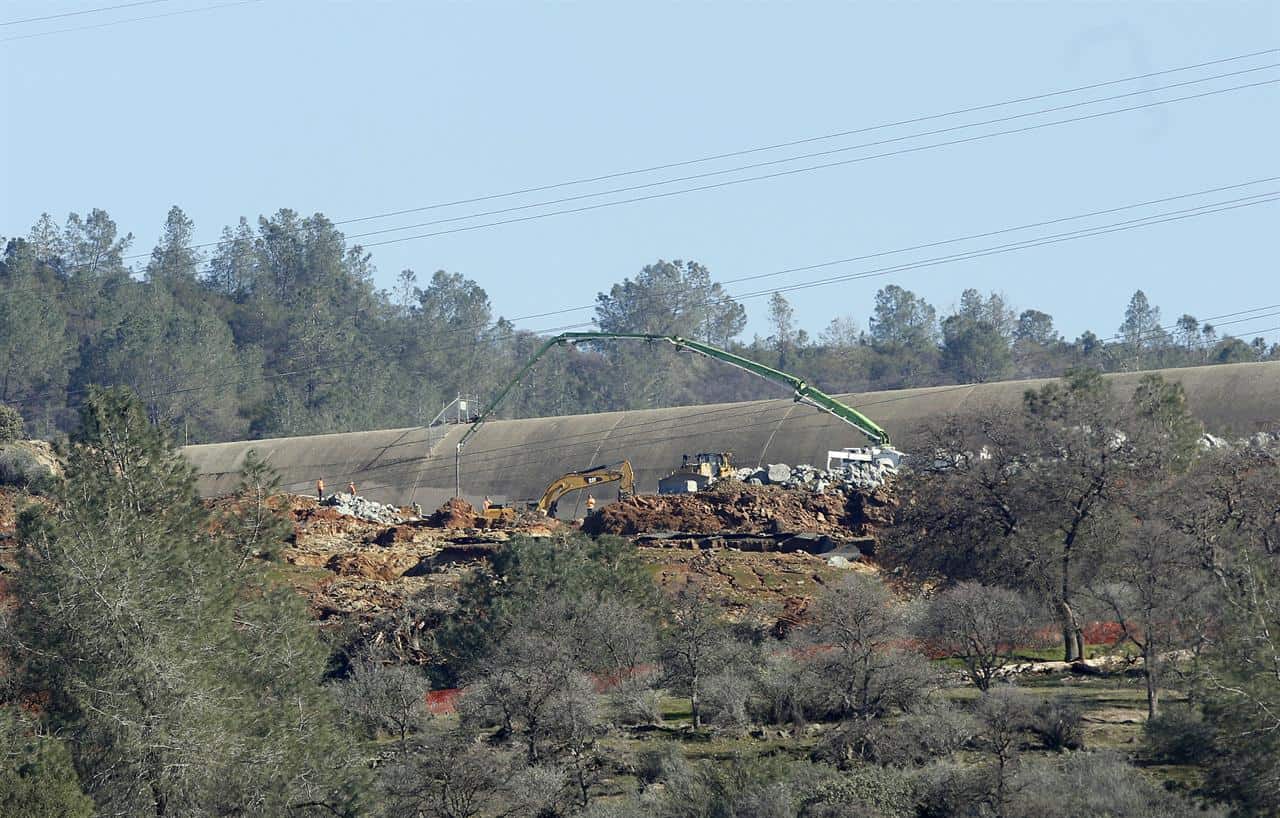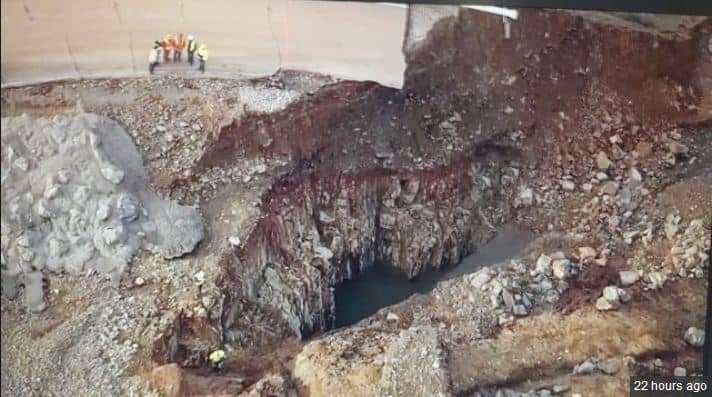Great opportunity here, for a surveyor/construction staker,/ construction worker, to BUY a nice place BELOW the dam, (Housing prices should be down about now) and work for a few years rebuilding the dam! 🙂
John Hamilton, post: 413877, member: 640 wrote: Not exactly the same, but a lot of debris builds up behind the tainter gates on the navigation locks that we monitor. I asked why they don't remove the debris (lots of plastics, trash, logs, etc). They said then they would have to pay to dispose of it, so they wait for high water, open the gates, and it flushes down to the next dam. Then the next dam does it, and it repeats all the way down the river.
What a responsible plan that is!
Works the same way on dead bodies, human and non-human. Nobody wants to be the one involved in removing it from the water and, for non-human bodies, paying for the disposal thereof. Flush them on through and let them be someone else's problem.
cool photo!
I've watched the video clips taken from a helicopter and wondered if most viewers could actually appreciate the size of what was happening on the ground. The emergency spillway scoured a huge area, maybe in some places 20 or 30 feet. The spillway is another wonder all its own. Like I said, I don't think the average TV viewer can fathom the size of what's going on. Bringing rock in by air seems like trying to fill up a wheelbarrow with a tablespoon....a very expensive tablespoon.
The largest discharge this Okie has ever been close to was a 45,000 cfs discharge and it made me feel small. I can only imagine what a couple of hundred thousand cfs sounds like with that kind of velocity.
paden cash, post: 414303, member: 20 wrote: I've watched the video clips taken from a helicopter and wondered if most viewers could actually appreciate the size of what was happening on the ground. The emergency spillway scoured a huge area, maybe in some places 20 or 30 feet. The spillway is another wonder all its own. Like I said, I don't think the average TV viewer can fathom the size of what's going on. Bringing rock in by air seems like trying to fill up a wheelbarrow with a tablespoon....a very expensive tablespoon.
The largest discharge this Okie has ever been close to was a 45,000 cfs discharge and it made me feel small. I can only imagine what a couple of hundred thousand cfs sounds like with that kind of velocity.
Several years ago there was a wall collapse at the Oroville power plant and 5 men were almost sucked through the hole due to the vacuum from the discharge flow velocity. I believe I read that in the Cal dam report someone posted to this thread.
Paul in PA
Paul in PA is correct. That incident happened in July of 2009. I have spoken with two of the people who were present. The part they added (well, one of the many parts) was that the suction was so intense it blew out every light bulb so they were in total darkness trying to keep from getting sucked in and find a way to get the valve closed. Here is an article that came out after the investigation was completed.
http://www.chicoer.com/article/zz/20100223/NEWS/100227917
There was also a fire at the Thermalito Power Plant (just downstream from the Oroville Dam) on Thanksgiving Day 2012 which gutted the plant. It is still not back on line generating power.
Someone created this before/after viewer. Just slide the vertical line in the center left and right to see the comparison.
The before/after page is very cool!
Jim Frame, post: 414725, member: 10 wrote: The before/after page is very cool!
You are right, the new Recorders office looks very slick and shiny. But they don't open until 9am. As it happens the irrigation district has their R/S and Final Order of Condemnation in PDF form which they emailed to me.
If the information in the following linked article is correct about the auxiliary spillway foundation and downhill weathered and fractured soft bedrock, they have truly dodged a bullet when that spillway started flowing for the first time. Most dam rehabilitation's cost many more times the cost of the original structure. Wouldn't surprise me to see a new billion dollar roller compacted concrete spillway built for this fix. Going to suck up a lot a a years production of Portland cement. Might be the first environmental impact statement completed in a week.
http://www.latimes.com/local/california/la-me-oroville-spillway-failure-20170216-story.html
I would like to read an actual engineering report on the situation. The small amount of info in the article is disturbing to say the least.
Paul in PA, post: 414351, member: 236 wrote: Several years ago there was a wall collapse at the Oroville power plant and 5 men were almost sucked through the hole due to the vacuum from the discharge flow velocity. I believe I read that in the Cal dam report someone posted to this thread.
Paul in PA
So the spillway damage was probably caused by cavitation? That process caused incredible damage here at the Glen Canyon Dam in the 1980's.
Jim in AZ, post: 415167, member: 249 wrote: So the spillway damage was probably caused by cavitation? That process caused incredible damage here at the Glen Canyon Dam in the 1980's.
I believe the power plant is located below the main dam, not near the spillway.
imaudigger, post: 415164, member: 7286 wrote: Here is a picture of the area they were concerned with (I think). Not very competent looking bedrock.
Not sure where this picture was taken, but it again helps show the actual size of the erosion.
Yeah, that is scary as hell!
imaudigger, post: 415175, member: 7286 wrote: I believe the power plant is located below the main dam, not near the spillway.
Okay ... So the spillway damage was probably caused by cavitation?
Well it operated without failure for 48 years, carrying flows as high as 165,000 cfs in 1997, so I am not sure that "probably caused by cavitation" is the conclusion to jump to at this point. Not sure the initial cause will ever be determined based on how much destruction has occurred since the initial failure. Not much left to inspect and nothing left of the original area of failure. The outflow isn't even going down the bottom section of the spillway now because it blew out on the south side and followed/carved a natural channel down the hill to the river.
I bet there are aeration slots incorporated into the new spillway regardless of the theories.
I'd like to see if they incorporate precast concrete panels into the design of the new spillway.
They could get started on constructing panels off site this spring in order to be ready for construction during the summer.
It appears the Oroville spillway was designed and constructed just prior to information being published on cavitation in spillways. Other spillways have since been upgraded to reduce cavitation. What is being missed by many is that in recent inspections the they avoided actually inspecting the spillway in detail. It is highly probable that cavitation had caused sufficient changing of the spillway surface that cavitation would be increasingly induced in future events. From what I can see in pictures and videos which are slow in being released is that the at least the lower 75% of the spillway will have to be replaced. Everything from the break on down has been compromised by underminng of the supporting soil and rock.
From the Noon press conference yesterday I got the impression that they may require 2 years to fully repair it. Somehow they think they can continue to operate the reservoir without complete repairs.
My personal opinion is that the reservoir should be reduced to 75% below typical use until final solutions are installed. A new lower elevation spillway should be constructed and they have to fully repair the bottom drains to 100% effectiveness not the current 40%. After that it the reservoir should be limited to 90%.
Paul in PA
Paul, are you privy to the dam inspection reports? What makes you think they purposely avoided a detailed inspection of the spillway?
Who is "they"?
I am not familiar with dam inspection procedures, but I suspect inspection is done on a specified interval, which is dependent on the condition of the structure.





